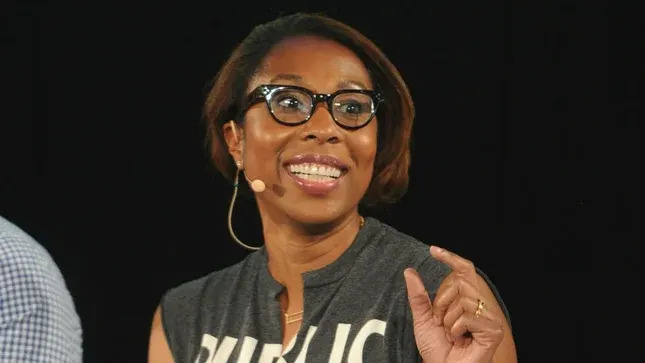Updated January 5
‘All Things Considered’ Co-Host Exits Friday
A Tipsy Don Lemon Says ‘Haters’ Can Kiss It
Editors Say They Are Maturing on Race Coverage
‘Very Asian’ Trends After Caller’s Intolerance
Baltimore Startup Names Blacks to Key Posts; Is Hiring
List Circulates of Allegedly Fake Native Americans
Rep. Bobby Rush to Step Down
Short Takes: Univision and Fusion; Sharif Durhams and Monica Norton; Washington Football Team; Michael Harriot and Panama Jackson; new crime coverage guidelines; Joe Madison’s hunger strike; Rob Capriccioso’s Indigenous Wire
Support Journal-isms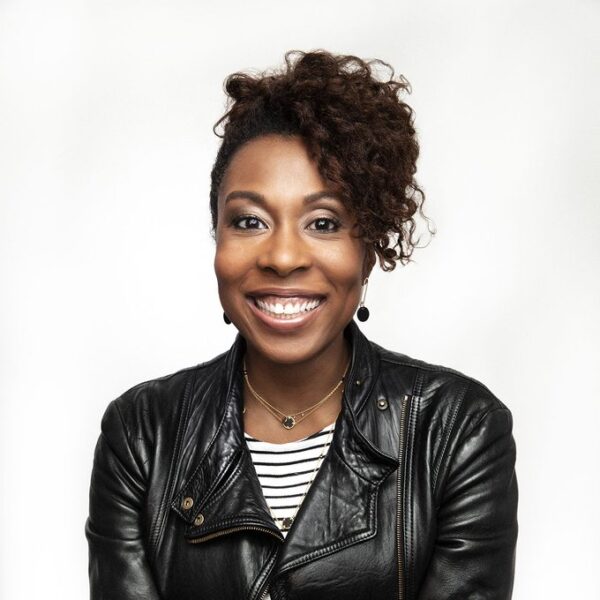
‘All Things Considered’ Co-Host Exits Friday
Audie Cornish, a co-host of NPR’s signature “All Things Considered” and a host at NPR’s magazines since 2011, is leaving the network, Cornish announced Tuesday.
“Hosting All Things Considered helped me find my voice, but I have never considered the host chair a tenured position and there is still much to learn,” Cornish said in a note to the staff. “It’s time for me to try my hand at new journalism projects and embark on new adventures.”
On Twitter, some of Cornish’s current and former NPR colleagues portrayed the exit as part of an exodus. Ari Shapiro wrote, “She opened doors for me in so many ways and taught me so many things — not least how to be a host. It has been difficult this year to say goodbye to @nprgreene @lourdesgnavarro @NoelKing @RadioMirage
and more. If NPR doesn’t see this as a crisis, I don’t know what it’ll take.”
The references are to David Greene, Lourdes “Lulu” Garcia-Navarro, Noel King and Shereen Marisol Meraji respectively.
However, Joshua Johnson, who left NPR’s Washington affiliate WAMU for NBC, tweeted, “NPR is better for having an inclusive workforce. But it would be far worse if that workforce thought it had nowhere to go except @NPR. Reaching our potential requires new avenues for growth and possibility. There’s a huge difference between feeling safe, and feeling stuck.”
He also tweeted, Besides, it’s not like the BIPOC hosts who’ve left NPR fell off a cliff! We’re growing and learning on new platforms. And now someone else can come in behind us. What a blessing it is to open doors for others: to prop them open, kick them down or (my favorite) build new ones.”
Cornish told Twitter followers, “I am joining many of you in ‘The Great Resignation,’ ” but also wrote that “I love my job. I love the listeners of @NPR and the people who make it.”
NPR spokesperson Isabel Lara told Journal-isms, “We’ll conduct a national search for Audie’s replacement, we’re considering everyone – internal and external.
“Our most recent hires have been internal (Ailsa Chang, Noel King, Leila Fadel) or external A Martinez. We’re looking for the best candidate for the job. We have lots of great talent to fill-in in the mean time.”
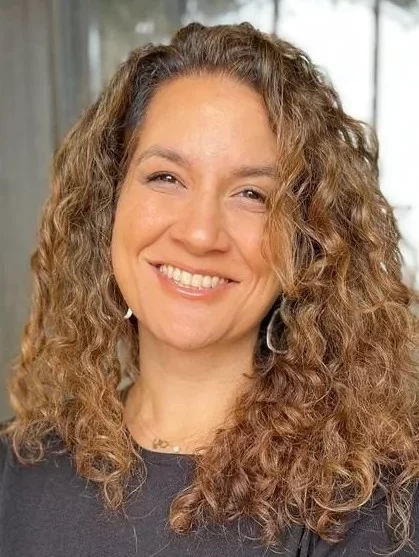 Last week, Fadel (pictured), who is Lebanese-American, was named the fourth host of “Morning Edition,” NPR’s morning drive time news magazine carried by 834 public radio stations, and “Up First,” NPR’s daily morning news podcast.
Last week, Fadel (pictured), who is Lebanese-American, was named the fourth host of “Morning Edition,” NPR’s morning drive time news magazine carried by 834 public radio stations, and “Up First,” NPR’s daily morning news podcast.
Cornish had begun hosting NPR’s “Weekend Edition Sunday just two months prior to being chosen in 2011 to replace Michele Norris as co-host of “All Things Considered” while Norris took a year’s leave from her hosting role. The move kept an African American woman in the co-host slot at a time when NPR’s racial issues were under the microscope.
Norris’ husband, Broderick Johnson, had accepted a senior adviser position with then-President Barack Obama’s reelection campaign.
Cornish’s “reporting on the opioid crisis in Baltimore earned a Salute to Excellence Award from the National Association of Black Journalists in 2016,” NPR said in a blogpost Tuesday. “In 2020, the National Press Foundation recognized her work with the Sol Taishoff Award for Excellence in Broadcast Journalism.”
In 2016. Cornish brought her personal experience to bear on a story, “Looking Back On 50 Years Of Busing In Boston.”
” ‘There are communities around this country that have schools that are more segregated today than they were 10 years or 20 years ago,” [Education Secretary] John B. King Jr. said [that] January.
“I know this, in part, because I was in a desegregation program as a kid: a school busing program in Boston that is still going today. . . .”
Cornish was a reporter for public broadcasting’s WBUR in Boston before joining NPR’s National Desk in 2005. Her last on-air day is to be Friday.
Ohh Don Lemon is loose off that goose! #CNNYE #NYE2021 pic.twitter.com/OL4lkU0zjo
— Giselle Phelps (@GisellePhelps) January 1, 2022
A Tipsy Don Lemon Says ‘Haters’ Can Kiss It
“Tell us how you really feel, Don Lemon!,” Brent Furdyk wrote Sunday for Entertainment Tonight Canada.
Alexandra Jane wrote for the Root, “Lemon was passed a few too many — leading to a full on rant, popping out of a lemon cake, and a good bit of on-air twerking.
“Don Lemon, who joined the network in 2003 as an anchor, has always been outspoken, but only during the holiday do we get to watch him get loose off the goose (or was it tequila?) like this.”
Furdyk continued, “The CNN anchor was among the cable news net’s personalities to imbibe during CNN’s annual live coverage of the New Year’s Eve festivities, and at one point kicked off a rant about why his ‘haters’ continually attack him.
” ‘I don’t give a — what you think about me, what do you think about that,’ said Lemon, holding a drink in one hand and a microphone in the other while in New Orleans with fellow anchor Alisyn Camerota and comedian Dulce Sloan.
“ ‘I don’t care. I’m a grown-a** man, I don’t care what you think about me,’ he continued.
“ ‘I am who I am. I’m a grown, successful black man who a lot of people hate because they’re not used to people seeing me — and people like me — in the position that I am,’ Lemon added. ‘To be able to share what I… my point of view on television, it freaks people out. And you know what? You can kiss my behind. I do not care.’
“Lemon kept on going. ‘ “I don’t care. I really don’t care. I have one life and this is who I am and I feel very, um…,’he said, with Sloan completing his thoughts by adding the word ‘blessed.’
“ ‘Blessed and honoured to be in this position,’ Lemon said. ‘To be able to do this. So all the hate I get? It’s motivation to me. Bring it, I don’t care.’. . .”
The year’s final “Washington Week.” (Credit: PBS/YouTube)
Editors Say They Are Maturing on Race Coverage
“There’s no doubt race will continue to be a central issue to cover next year,” moderator Yamiche Alcindor said Friday in the closing moments of the final PBS’ “Washington Week” of 2021.
She was speaking with Terence Samuel, managing editor for news for NPR; Julie Pace, executive editor and senior vice president of the Associated Press; Elisabeth Bumiller, assistant managing editor and Washington bureau chief of The New York Times; and David Chalian, vice president of political coverage and political director of CNN.
“Terence, I wanna come to you because there are few, few people of color, Black men in particular, who are newsroom leaders,” Alcindor continued. “Talk a little bit about what you think about the state of diversity in newsrooms and how should organizations focus on hiring, but also promoting people of color in their newsrooms.”
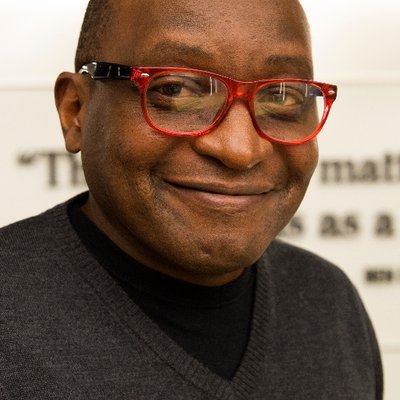 SAMUEL (pictured): “Yeah, I think you saw it as I mentioned with COVID and covering the president, we became a part of a very big story. The racial reckoning became a story about who tells these stories and, are newsrooms equipped to do it? And obviously the short answer is, ‘not nearly close enough’.
SAMUEL (pictured): “Yeah, I think you saw it as I mentioned with COVID and covering the president, we became a part of a very big story. The racial reckoning became a story about who tells these stories and, are newsrooms equipped to do it? And obviously the short answer is, ‘not nearly close enough’.
“The good thing, I think, though, was that it has become such an unavoidable topic. And we are in some ways, I think, doing a much better job than we had been, and [a] much better job than, speaking specifically about NPR, than a lot of people are in trying to have this conversation. It is the fundamental American conversation.
“And for a long time, we were avoiding it. We talk about misinformation, years and years of misinformation. And I think we finally have, in some cases, a whole generation of reporters in newsrooms demanding that we do things differently, and I think for newsrooms like mine, it continues to be a struggle, but I think a good one.”
ALCINDOR: Yeah, a good struggle is a good way to put it. Julie, how has the racial reckoning affected the way that your organization has thought about covering race? Not only just police killings, but I’m also thinking of housing, of health, of the economy as we see inflation rising. And how does that also impact the assignments that you make, the reporters that you choose to cover stories?”
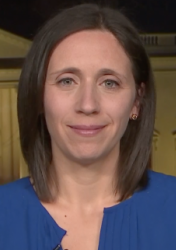 PACE (pictured): “Well, I think you touched on something really important here. There is coverage of race around what we saw in terms of protests in the streets after George Floyd’s death or coverage of police killings. But what we’ve tried to do at AP is really tried to look for what is the discussion of race in any subject area?
PACE (pictured): “Well, I think you touched on something really important here. There is coverage of race around what we saw in terms of protests in the streets after George Floyd’s death or coverage of police killings. But what we’ve tried to do at AP is really tried to look for what is the discussion of race in any subject area?
“What is it, vis-a-vis the pandemic or education or housing or economics? And I think that that is a really positive change in the discussion that we’re having.
“Any issue that we are talking about in this country, there’s a racial component to it. There’s an inequality component to it. And we’ve really tried to put that at the forefront of the coverage and it’s sparked some really fascinating conversations. I think some really important stories and really crucially, it has also lifted up new voices within the newsroom. We’ve really seen as particularly younger reporters, really empowered, really trying to push us in leadership to think about these stories in a different way.
“It’s affected the conversations we’re having when we are hiring staff, and what I hope and what I think our responsibility is as leaders is to make sure that those changes that we are seeing are sustained, but this is not something that we are doing just because we are still so close to what we saw happening in this country after the death of George Floyd, that this is a systemic change. It’s gonna be difficult and it’s gonna take real commitment. But I think that the result in terms of our journalism and reaching a broader array of people in this country and around the world, that’s really positive. We have to always aim for that goal.
ALCINDOR: Yeah, and we have about a minute left. I’m gonna try to split it between Elisabeth and David, ’cause I can’t choose which one. So Elisabeth, The New York Times, of course, the 1619 Project, you’ve got so much flak from your newsroom, had to push back on political falsehoods. How has the conversation been in your newsroom, especially in D.C., which isn’t connected in some ways to the 1619 Project, but it’s dealing with the consequences.
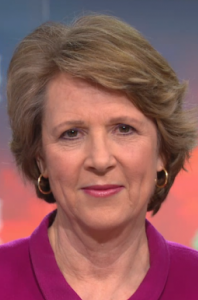 BUMILLER (pictured): “Well, I just would say that covering race at The New York Times is a shared responsibility. I’m gonna bounce off a little bit with what Julie said. We covered [it] as a topic, but it’s also, again, a part of everything we do, again, from the White House to health care, to all those issues that Julie talked about.
BUMILLER (pictured): “Well, I just would say that covering race at The New York Times is a shared responsibility. I’m gonna bounce off a little bit with what Julie said. We covered [it] as a topic, but it’s also, again, a part of everything we do, again, from the White House to health care, to all those issues that Julie talked about.
“And I think that most reporters at the Times need to have a basic expertise in civil rights history and how this is important to us. So I would say that we weren’t completely affected by the 1619 Project in Washington, but we are a big part of the coverage of race at The New York Times from — we cover the government and that is a huge issue, all throughout Washington. And I would just say again, and certainly our newsroom has become far more diverse than it was even five years ago.
 ALCINDOR: Yeah, and David, with 20 seconds left. . . CNN, I know has a whole racial justice unit. Why is that a good thing? Why is it is . . . good to separate it? Or do you think that there’s a problem there possibly in separating it?
ALCINDOR: Yeah, and David, with 20 seconds left. . . CNN, I know has a whole racial justice unit. Why is that a good thing? Why is it is . . . good to separate it? Or do you think that there’s a problem there possibly in separating it?
CHALIAN (pictured): Yes, we have a race and justice unit . . . but the point is, is that it integrates with every issue across the newsroom. So when you hear, as Julie was saying, whether it is immigration or the economy or education, or the pandemic, which was one of the examples, that race and justice team plugs into all of those coverage areas, making sure that it’s front and center in our story today.”
- Matt DeRienzo, Nieman Lab: Predictions for Journalism 2022: Historical context will improve local journalism
- Dorothy Gilliam, Columbia Journalism Review: What Do Black Journalists Want? (reprint from 1972 for CJR’s 60th anniversary)
- Lauren Harris, Columbia Journalism Review: Building the Open Newsroom: a Q&A with The City‘s Nic Dawes (Dec. 22)
- Kristen Jeffers, Nieman Lab: Predictions for Journalism 2022: A press where Black labors are not in vain
- Marcela Kunova, journalism.co.uk: Predictions for digital journalism: audience, diversity and newsroom leadership in 2022 (Dec. 17)
- Alex Sujong Laughlin, Poynter Institute: When newsroom inclusion stops at hiring ‘diversely,’ reporters shoulder the burden of credibility (Dec. 14)
- Doris Truong: Nieman Lab: Predictions for Journalism 2022: Inverting the talent pipeline
We’re proud to be #VeryAsian. Thank you to @MichelleLiTV and @Gia_Vang for setting up this incredible pop-up project bringing awareness to the pervasive nature of anti-AAPI attitudes in this country. Show your support for AAJA and AAPI journalists: https://t.co/npfPg3hBpM
— Asian American Journalists Association est. 1981 (@aaja) January 4, 2022
‘Very Asian’ Trends After Caller’s Intolerance
“On New Year’s Day, a viewer in St. Louis, Missouri called KSDK, the local NBC affiliate and KARE 11’s TEGNA sister station, and left a voicemail,” Alexandra Simon wrote Tuesday, updated Wednesday, for KARE in Minneapolis.
“In that message, a woman criticized award-winning anchor Michelle Li (pictured, below) for talking about what Korean people eat on New Year’s Day.
” ‘It was a simple story,’ Li wrote. ‘Americans eat greens for wealth, black eyed peas for luck, cornbread for gold, and pork for progress. And then at the end, I said, “I ate dumpling soup. That’s what a lot of Korean people do.” ‘
“The caller said she took offense to Li’s segment, saying Li was being ‘very Asian’ on TV and that she should ‘keep her Korean to herself.’ The caller went on to say that if a white person talked about what they ate on New Year’s Day ‘they would get fired.’
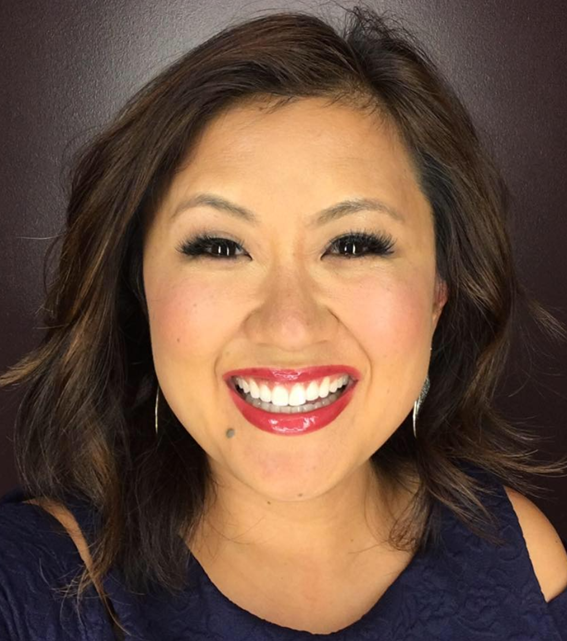 “You can listen to the full voicemail on Li’s Instagram page.
“You can listen to the full voicemail on Li’s Instagram page.
Simon wrote separately Tuesday, updated Wednesday, “Li, who is a Korean adoptee, responded to the incident in an article, writing, ‘We should all be allowed to bring our full humanity to the table and this is what happens when you’re perceived as perpetually foreign.’
“As a show of support, KARE 11 Sunrise anchor Gia Vang, who is Hmong, retweeted Li’s video and said ‘Hmong people consume a lot of Hmong sausage, chicken, pork with pepper this time of year. @MichelleLiTV I must be #VeryAsian too right now.’
“In just a few days, the #VeryAsian hashtag exploded on Twitter and generated national attention. Fellow journalists and members of the AAPI community are still sharing messages of support for Michelle, and Twitter users have started using the hashtag to share photos of their own traditional Asian meals. . . .”
Supporters included “George Takei, Margaret Cho, Ken Jeong, dozens of celebrities and thousands more people,” according to Anne Stegen, writing Monday for KSDK.
Moreover, Simon wrote for KARE, “Vang and Li designed a series of shirts, hats and sweatshirts for both adults and kids. After costs, all proceeds will be donated to the Asian American Journalists Association, whose goal is to advocate for AAPIs in newsrooms, advance diversity and ensure fair and accurate coverage of communities of color.” [updated Jan. 5]
- Marian Chia-Ming Liu, Washington Post: The Power of Reclaiming My Asian Name
Baltimore Startup Puts Blacks in Key Posts; Is Hiring
The Baltimore Banner, a startup founded by Maryland hotel magnate Stewart Bainum, has hired Black journalist Andrea K. McDaniels as managing editor and another Black journalist, Baltimore native Lawrence Burney, as arts editor, the nonprofit digital publication announced Wednesday.
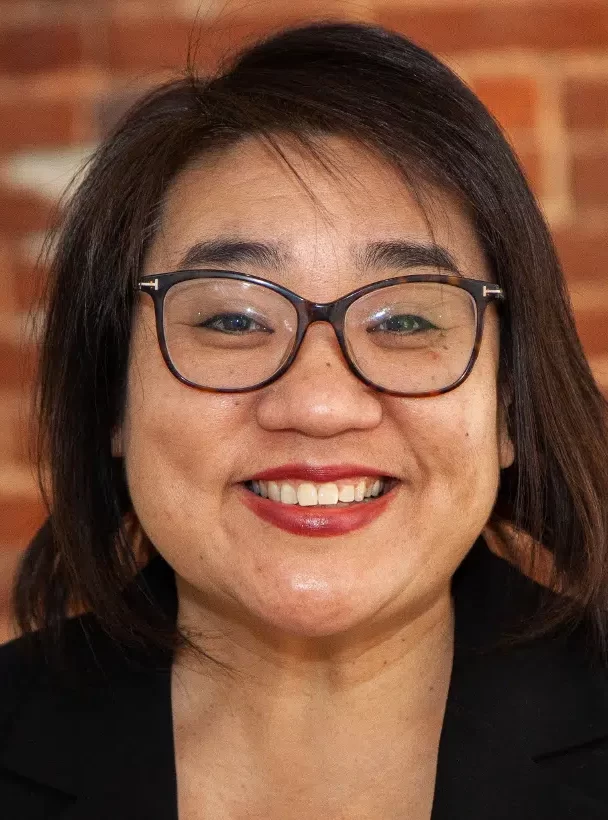 Bainum previously hired Kimi Yoshino (pictured), a managing editor at the Los Angeles Times, as editor in chief.
Bainum previously hired Kimi Yoshino (pictured), a managing editor at the Los Angeles Times, as editor in chief.
“This is just the start of the very special and talented team we’re building,” Yoshino tweeted Wednesday. “We’re hiring more editors and reporters. We’ll fill these beats: health, education, cops, breaking news, investigative, City Hall, state politics, food…to name a few. Apply.”
Also hired are Justin Fenton, Liz Bowie and Tim Prudente, veteran Baltimore Sun reporters.
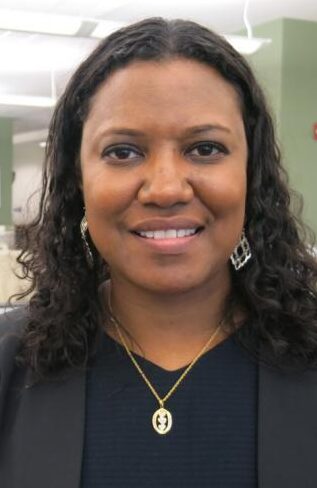 Wednesday’s announcement said, “McDaniels (pictured) is a journalist with more than 25 years of experience as an editor and reporter covering a wide range of issues including local politics, business and health. Her health reporting at The Baltimore Sun, where she worked for two decades, won national awards. Most recently she served on the newspaper’s editorial board, helping to shape the publication’s stance on key issues facing readers. The Virginia native also worked at The Charlotte Observer.”
Wednesday’s announcement said, “McDaniels (pictured) is a journalist with more than 25 years of experience as an editor and reporter covering a wide range of issues including local politics, business and health. Her health reporting at The Baltimore Sun, where she worked for two decades, won national awards. Most recently she served on the newspaper’s editorial board, helping to shape the publication’s stance on key issues facing readers. The Virginia native also worked at The Charlotte Observer.”
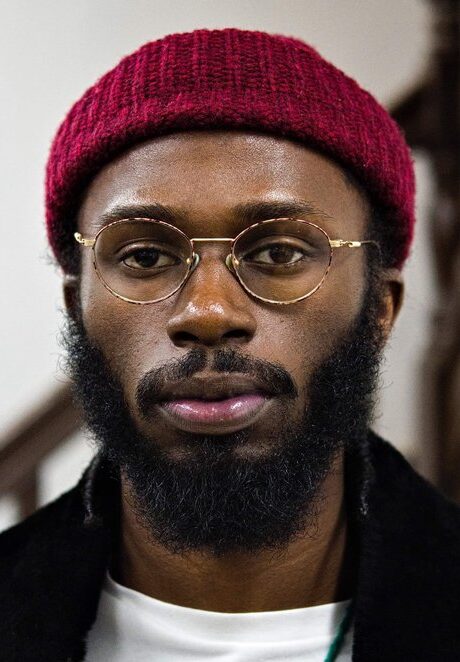 Burney (pictured), the announcement said, is “an artist-in-residence at the Enoch Pratt Free Library in Baltimore. Burney’s storytelling has traditionally focused on finding — and sharing — the intersections of history, culture, and contemporary art in Black communities in his hometown.” Yoshino tweeted, “Lawrence Burney @truelaurels blew me away with his creativity and ideas. He started his own mag (!!) to fill a void in coverage of the Baltimore music scene and will now be our arts + culture editor. We’ve got plans (and writers) in the works that I can’t wait to share.”
Burney (pictured), the announcement said, is “an artist-in-residence at the Enoch Pratt Free Library in Baltimore. Burney’s storytelling has traditionally focused on finding — and sharing — the intersections of history, culture, and contemporary art in Black communities in his hometown.” Yoshino tweeted, “Lawrence Burney @truelaurels blew me away with his creativity and ideas. He started his own mag (!!) to fill a void in coverage of the Baltimore music scene and will now be our arts + culture editor. We’ve got plans (and writers) in the works that I can’t wait to share.”
Sarah Ellison reported for The Washington Post in October, “The Maryland hotel magnate made a bold bid to buy the Baltimore Sun and its parent, Tribune Publishing, in what he described as a mission to restore local ownership and keep the newspapers out of the hands of a hedge fund with a history of stringent cost-cutting at its media properties.
“Bainum’s months-long effort fell short — but he ended it, he said at the time, with a renewed conviction ‘that a better model for local news is both possible and necessary.’
“Now he’s putting that belief to the test . . . and committed $50 million of his own fortune to get it started.
“The plan, Bainum said, is not to compete with the Sun but to cover the news in a city that he said has more than enough for one outlet. . . .”
Baltimore is a majority-Black city, although the county that surrounds it is not. According to 2021 census projections, the county was 30.3% Black or African American alone; 5.8 percent Hispanic or Latino, 6.3 percent Asian alone; 0.4 percent American Indian and Alaska Native alone; and 60.2 percent white alone.
The dominant Baltimore Sun, like other Tribune Co. newspapers now owned by Alden Global Capital, reported to the News Leaders Association in 2019 that its newsroom was 20.88 percent people of color. [PDF]
They included 10 Blacks, three Hispanics, six Asian Americans, 72 whites and no Native Americans. [added Jan. 5]
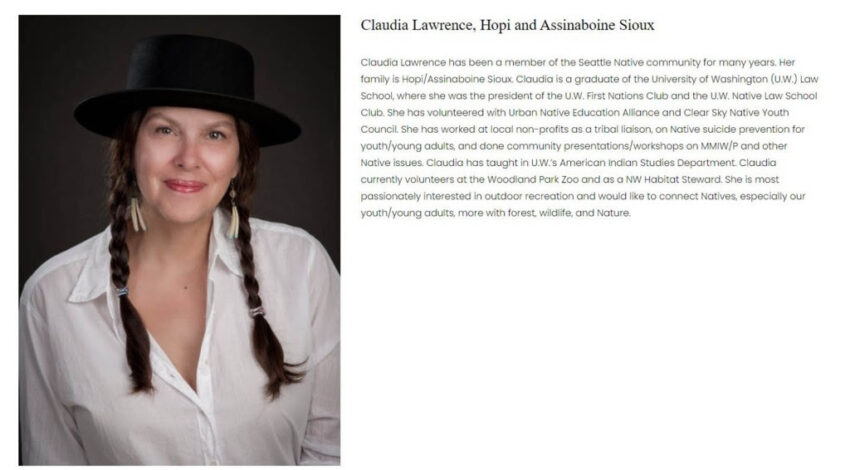
List Circulates of Allegedly Fake Native Americans
“A list of allegedly fake Native Americans has begun circulating in tribal and academic circles, accusing 195 people of falsely claiming an Indian identity for personal gain,” Jon Levine reported Saturday for the New York Post.
The list includes a woman who had joined the Native American Journalists Association, then was forced to withdraw.
The reversal by Claudia Lawrence, who claimed to be a member of the Seattle Native community and said her family was Hopi/Assinaboine Sioux, came in January 2021.
That followed publication of an op-ed by Lawrence in The New York Times, which in an appended editor’s note on Jan. 29, 2021, said, “After publication, The Times learned of an allegation that Ms. Lawrence is not Native American, and editors conducted a review. When asked, Ms. Lawrence was unable to provide evidence of Native ancestry; she is not an enrolled member of any federally or state-recognized tribe. If the editors had known that there were questions about her connection to the Native community, this essay would not have been published until those questions had been resolved.”
Levine continued, “The ‘Alleged Pretendians List’ is the creation of Jacqueline Keeler, a Native American writer and activist who has spent years busting fakers in politics and academia. . . .” Keeler, however, has been accused of anti-Black behavior.
WBBM-TV in Chicago covers Rep. Bobby Rush’s retirement announcement Tuesday.
Rep. Bobby Rush to Step Down
Rep. Bobby Rush of Illinois, one of the Black members of Congress who has expressed concern about African American representation in the news media, told the Chicago Sun-Times in an interview published Monday that he won’t run for a 16th term in the House of Representatives,Lynn Sweet wrote in the Sun-Times. Rush made the formal announcement Tuesday.
The Chicago Democrat, 75, was active in the Black Panther Party and the Student Nonviolent Coordinating Committee in the 1960s.
In 2011, during the Congressional Black Caucus Legislative Weekend, Rush hosted a forum, “The Deciders…Who Calls the Shots in Broadcast News.”
“Learn what a congressman does,” Rush told the audience. “In my 18 years (in Congress), I know what black power is, and I’m sure that . . . members of Congress have that. . . . I sit on the Telecommunications Subcommittee (of the House Committee on Energy and Commerce). I want you all to give me the questions. All I know is the power I have. We have 43 members of the Congressional Black Caucus, the largest caucus in the Congress and the largest ever.”
Panelists and their positions at the time were Carole Simpson, former anchor, ABC News; Gregory Lee, president of the National Association of Black Journalists and assistant sports editor, Boston Globe; David Honig, president and executive director, Minority Media and Telecommunications Council; and Camille Edwards, vice president of news, WRC-TV in Washington. The moderator was Bob Butler, NABJ vice president/broadcast and KCBS Radio reporter, Bay area.
Though all of the journalist of color organizations say they want ties to their communities, it has not always been easy for organizations of journalists to draw the line between honoring journalistic principles and working with potential news sources.
Lee said then, “NABJ is a non-profit organization, which doesn’t deliver news, it trains and educates members on being better journalists and better professionals.”
Short Takes
- “Univision has pulled the plug on Fusion TV, the cable network it initially conceptualized as an English-language news and lifestyle channel targeting millennial Latinos. But it ended up being a mishmash with no true identity that evolved into a convoluted money-losing mess,” Veronica Villafañe reported Friday for Forbes. “The network ceased operations today, December 31. Its rocky tenure lasted 8 years. . . .”
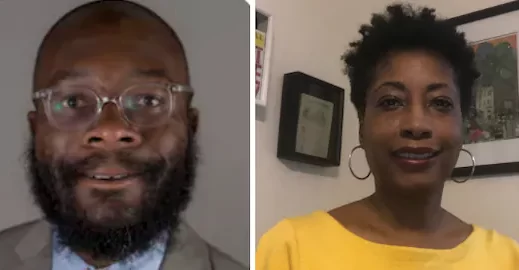 Black journalists Sharif Durhams and Monica Norton (pictured), along with Mark W. Smith, will become deputy managing editors at The Washington Post, the news organization announced Monday. “Sharif has been managing editor of North Carolina’s News & Observer and Herald-Sun since January 2021, where he launched a plan to increase the staff and served as interim editor from July to September. This will be a return to The Post for Sharif; he was our night homepage editor for much of 2020 after a three-year run as a senior editor for programming at CNN,” the announcement said. Durhams is also president of NLGJA: the Association of LGBTQ Journalists. Norton has been deputy Local editor for planning and enterprise since 2011.
Black journalists Sharif Durhams and Monica Norton (pictured), along with Mark W. Smith, will become deputy managing editors at The Washington Post, the news organization announced Monday. “Sharif has been managing editor of North Carolina’s News & Observer and Herald-Sun since January 2021, where he launched a plan to increase the staff and served as interim editor from July to September. This will be a return to The Post for Sharif; he was our night homepage editor for much of 2020 after a three-year run as a senior editor for programming at CNN,” the announcement said. Durhams is also president of NLGJA: the Association of LGBTQ Journalists. Norton has been deputy Local editor for planning and enterprise since 2011.
- “A year and a half after retiring its old name and promising a new one, the Washington Football Team will soon reveal its identity. In a video published Tuesday morning, Washington announced that it will unveil its name and logo Feb. 2,” Nicki Jhabvala reported for The Washington Post. The Native American Journalists Association was among the organizations successfully urging a name change, and Suzan Shown Harjo, an activist, journalist and former NAJA board member, was active in litigation.
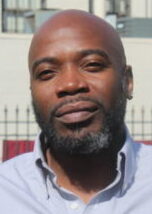 Writer Michael Harriot (pictured), who left The Root in November as part of a larger exodus, has joined The Grio, he announced Tuesday. “ I come to you as humble as I know how,” Harriot said. Jan. 5 update: Panama Jackson, one of the “Very Smart Brothas” at The Root, has also joined The Grio.
Writer Michael Harriot (pictured), who left The Root in November as part of a larger exodus, has joined The Grio, he announced Tuesday. “ I come to you as humble as I know how,” Harriot said. Jan. 5 update: Panama Jackson, one of the “Very Smart Brothas” at The Root, has also joined The Grio.
- “The Radio Television Digital News Association has issued new guidelines for Crime Coverage as part of a routine overview of Coverage Guidelines from the RTDNA Ethics Committee,” the association reported. “The new guidelines include the use of mugshots and police released video; the use of ‘suspect’ or ‘person of interest’ descriptions; non-violent crime reporting; and considerations for policies to update digital crime stories. . . .” Separately, a law limiting Oregon law enforcement agencies’ ability to release booking photos to the public went into effect Jan. 1. “Under the measure, booking photos won’t be released to the public — except in a few specific circumstances — to protect the identity of individuals who haven’t been convicted of a crime in Oregon,” Virginia Barreda reported Thursday for the Salem Statesman Journal.
- “It was Monday, Day 57 of Joe Madison’s hunger strike — no solid foods, he’d vowed, until Congress passes laws protecting the voting rights of all Americans. I’d called the SiriusXM radio talk show host at his home in D.C. to see how long he thought he could keep this up,” Courtland Milloy wrote Tuesday for The Washington Post. “Madison is 72 and has battled cancer. With a hunger strike, he’s taking a risk. . . .”
 Rob Capriccioso (drawn by Marty Two Bulls Sr.), “the longtime D.C. Bureau Chief at Indian Country Today, the Senior Editor at Tribal Business News, a Contributing Writer at American Indian Report and News from Indian Country,” has founded Indigenous Wire, “A newsletter and blog focused on Indigenous policy, politics, economics and sovereignty.” Capriccioso is an enrolled citizen of the Sault Tribe of Chippewa Indians who grew up in the Bahweting region of the Upper Peninsula of Michigan.
Rob Capriccioso (drawn by Marty Two Bulls Sr.), “the longtime D.C. Bureau Chief at Indian Country Today, the Senior Editor at Tribal Business News, a Contributing Writer at American Indian Report and News from Indian Country,” has founded Indigenous Wire, “A newsletter and blog focused on Indigenous policy, politics, economics and sovereignty.” Capriccioso is an enrolled citizen of the Sault Tribe of Chippewa Indians who grew up in the Bahweting region of the Upper Peninsula of Michigan.
To subscribe at no cost, please send an email to journal-isms+subscribe@groups.io and say who you are.
Facebook users: “Like” “Richard Prince’s Journal-isms” on Facebook.
Follow Richard Prince on Twitter @princeeditor
Richard Prince’s Journal-isms originates from Washington. It began in print before most of us knew what the internet was, and it would like to be referred to as a “column.” Any views expressed in the column are those of the person or organization quoted and not those of any other entity. Send tips, comments and concerns to Richard Prince at journal-isms+owner@
View previous columns (after Feb. 13, 2016).
View previous columns (before Feb. 13, 2016)
- Diversity’s Greatest Hits, 2018 (Jan. 4, 2019)
- Book Notes: Is Taking a Knee Really All That? (Dec. 20, 2018)
- Book Notes: Challenging ’45’ and Proudly Telling the Story (Dec. 18, 2018)
- Book Notes: Get Down With the Legends! (Dec. 11, 2018)
- Journalist Richard Prince w/Joe Madison (Sirius XM, April 18, 2018) (podcast)
- Richard Prince (journalist) (Wikipedia entry)
- February 2018 Podcast: Richard “Dick” Prince on the need for newsroom diversity (Gabriel Greschler, Student Press Law Center, Feb. 26, 2018)
- Diversity’s Greatest Hits, 2017 — Where Will They Take Us in the Year Ahead?
- Book Notes: Best Sellers, Uncovered Treasures, Overlooked History (Dec. 19, 2017)
- An advocate for diversity in the media is still pressing for representation, (Courtland Milloy, Washington Post, Nov. 28, 2017)
- Morgan Global Journalism Review: Journal-isms Journeys On (Aug. 31, 2017)
- Diversity’s Greatest Hits, 2016
- Book Notes: 16 Writers Dish About ‘Chelle,’ the First Lady
- Book Notes: From Coretta to Barack, and in Search of the Godfather
- Journal-isms’ Richard Prince Wants Your Ideas (FishbowlDC, Feb. 26, 2016)
- “JOURNAL-ISMS” IS LATEST TO BEAR BRUNT OF INDUSTRY’S ECONOMIC WOES (Feb. 19, 2016)
- Richard Prince with Charlayne Hunter-Gault, “PBS NewsHour,” “What stagnant diversity means for America’s newsrooms” (Dec. 15, 2015)
- Book Notes: Journalists Follow Their Passions
- Book Notes: Journalists Who Rocked Their World
- Book Notes: Hands Up! Read This!
- Book Notes: New Cosby Bio Looks Like a Best-Seller
- Journo-diversity advocate turns attention to Ezra Klein project (Erik Wemple, Washington Post, March 5, 2014)
When you shop @AmazonSmile, Amazon will make a donation to Journal-Isms Inc. https://t.co/OFkE3Gu0eK
— Richard Prince (@princeeditor) March 16, 2018

